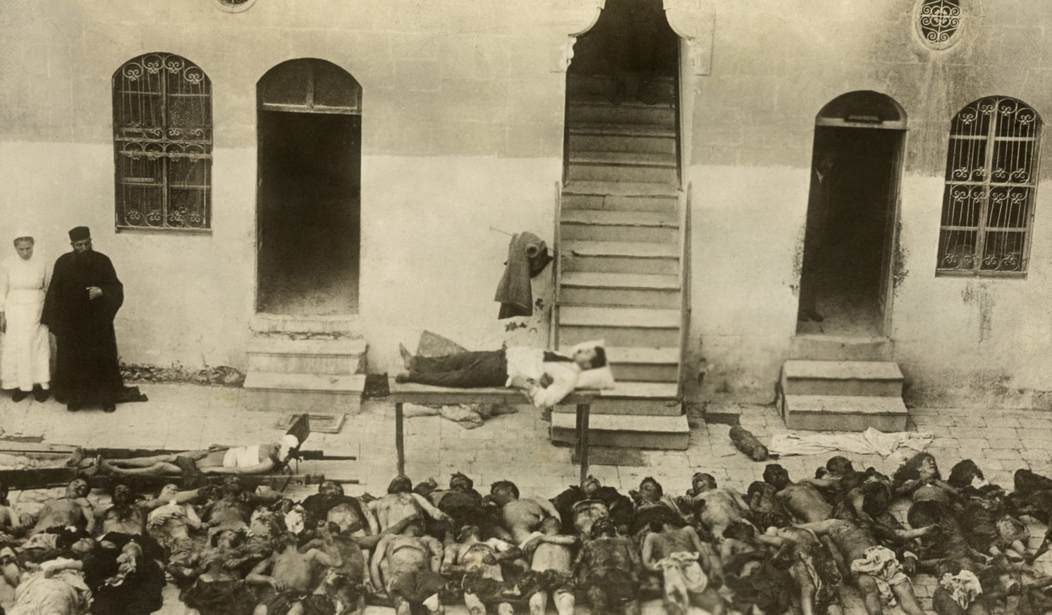On Thursday, the German Parliament passed a resolution acknowledging the massacre of Armenians between 1915 and 1916 as a genocide. In response, Turkey recalled its ambassador from Berlin, and the Turkish president said the official declaration would “seriously affect” relations between the two countries.
The Parliament passed a five-page resolution, co-written by members of the Christian Democrats, Social Democrats, and Green Party, which calls for “a commemoration of the genocide of Armenian and other Christian minorities in the years 1915 and 1916.” Every party supported the resolution, and it passed with only one abstention and one vote against, Britain’s The Guardian reported.
The Green Party’s Turkish-German co-chair, Cem Özdemir, said the resolution was “not about pointing fingers or claiming the moral high ground,” but arose from “a historic duty to encourage Turkish-Armenian reconciliation in friendship.”
Rather than attempting to take the moral high ground, the German resolution acknowledged that the German Empire during World War I, which was a close ally of the Ottoman Turks, was aware of the massacre and supported it politically. The five-page document acknowledged “the German Reich’s complicity in the events,” and mentioned the Holocaust no less than six times.
German Chancellor Angela Merkel, who voted for the resolution during a test vote at a party meeting Tuesday, did not attend the actual vote on Thursday. The deputy chancellor, Sigmar Gabriel, and the minister for foreign affairs, Frank-Walter Steinmeier, were also absent. The Left Party’s Gregor Gysi attacked Merkel’s absence as “not very brave.”
Over 20 countries have publicly declared the massacre of Armenians to be genocide, but Germany had long resisted using the word. As Turkey’s biggest trade partner in the European Union and home to a large ethnic Turkish minority, Germany has long had close ties with Turkey. Indeed, Thursday’s vote on the resolution was originally scheduled for last year, but was delayed due to pressure from the governing coalition, for fear of destabilizing Turkish-German relations.
Next Page: The Turkish Response.

photo story / Shutterstock.com. Turkish President Recep Tayyip Erdoğan is cracking down on the media.
Turkey adamantly insists that the massacre was not genocide, and that the numbers were much lower than the Armenian government’s estimates. Many historians and Armenians put the number at 1.5 million killed, but Turkey insists the number was close to 600,000.
The Turkish government declared that the German resolution “null and void,” and Turkish President Recep Tayyip Erdoğan said the vote would “seriously affect” ties between the two countries. Deputy Prime Minister Numan Kurtulmuş said the determination of genocide “is not a decision that should be made by politicians or parliaments; it is a decision that has to be made by historians.”
Foreign Minister Mevlüt Çavuşoğlu was more scathing: “The way to close one’s own dark pages of history is not by maligning another country’s history.”
Members of the Turkish Parliament’s Foreign Relations Commission released a statement in which they “strongly condemn and reject this bill falsifying historical facts about 1915 events.” The statement further added that “it is utterly unacceptable that the events, which took place under the special conditions of WWI 101 years ago and cause heartbreaking suffering for both Turks and Armenians, be introduceds as ‘genocide’ based on biased, distorted and various subjective political motives.”
Turkey already withdrew its ambassador to Germany, but further retaliation might be forthcoming. In recent months, an agreement to return migrants arriving on the Greek islands to Turkey has stemmed the tide of the migrant crisis in central Europe. Erdoğan has repeatedly questioned the conditions of the deal, and some members of his party cave threatened to cancel the agreement.
Next Page: The Ottoman Empire actually acknowledged the genocide, but here’s why Turkey started denying it.
Governments across the world have condemned the Armenian Genocide and criminalized any public denial of it. The first modern country to do so was Uruguay in 1965, and a broad range of countries, from Greece, Italy, Russia, and France to Chile, Canada, Argentina, Bolivia, and Brazil joined their ranks between the 1990s and today.
Before any of that, however, the Ottoman Empire itself (!) arguably acknowledged the genocide as “war crimes” against the Armenians in the Turkish courts-martial of 1919-1920. It sentenced many of the perpetrators to death.
In 1921, however, amnesty was given to those who were found guilty, and the government of Turkey under Mustafa Kemal Atatürk adopted a policy of denial. Atatürk accomplished great things for Turkey, modernizing the country and defeating various threats to unify modern Turkey from the rump of the Ottoman Empire.
Even those actions are controversial, however, as the secular government Atatürk established — bolstered by the practice of having the army overthrow the government if it became too religious — has struggled with deep Muslim criticisms in recent years. Nevertheless, Turkey’s denial of the Armenian Genocide is regarded as an issue of national pride.
Perhaps ironically, the United States has never officially declared the massacre a genocide, but 44 states have done so.
In April of last year, Pope Francis called the massacre “the first genocide of the 20th century.” American historians have estimated that over one million Armenians died from execution, starvation, disease, the harsh environment, and physical abuse. Armenians had lived in what we now call eastern Turkey for nearly 3,000 years, more than twice the amount of time the Islamic Turks have occupied Anatolia, now known as “Turkey.”
In the beginning of 1915 there were an estimated two million Armenians in Turkey, today there are fewer than 600,000. Survivor Aurora Mardiganian recalled being raped and thrown into a harem, and seeing 16 Christian girls crucified. “Each girl had been nailed alive upon her cross, spikes through her feet and hands, only their hair blown by the wind, covered their bodies,” Mardiganian wrote.
In the wake of Islamic State (ISIS) fighters targeting Christians in Syria and Iraq, the Armenian Genocide has a special resonance today. The Ottoman Empire was not as brazen as the Islamic State is today, but it is critical for nations around the world to avoid the horrific evil of the 20th century, and a repeat of the Armenian Genocide in Syria and Iraq is no way to begin the 21st. Muslims need to lead the fight in condemning such atrocities, presenting a version of Islam divorced from the historic abuses of Muslim conquest — abuses that inspired the Crusades.
Human evil will always be with us (until the Second Coming), but there are some kinds of evil which the vast majority of men and women can unite to condemn. Genocide is foremost among them, and the condemning it should never be controversial. If the Germans, the worst offenders in World War II, are no longer afraid to condemn the past of their own former ally and large trading partner, the Turks might be able to rethink their position.










Join the conversation as a VIP Member